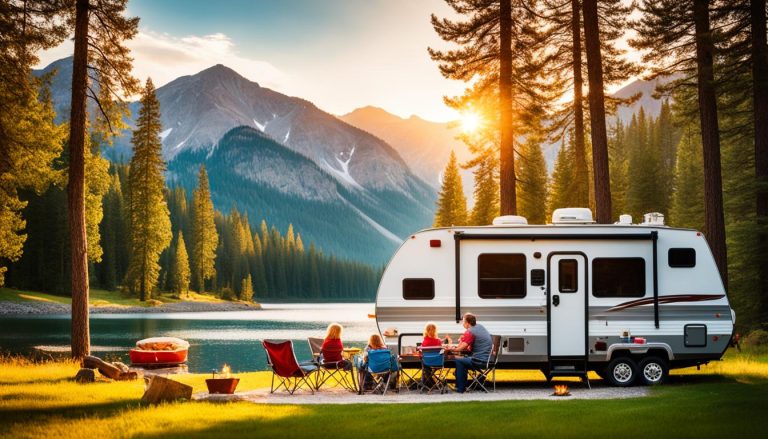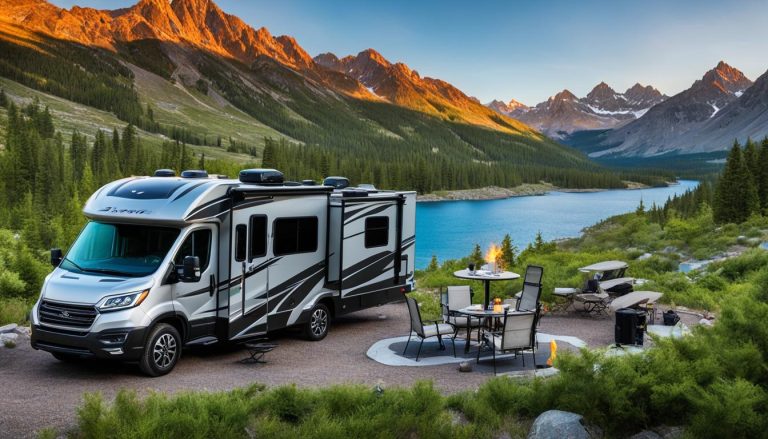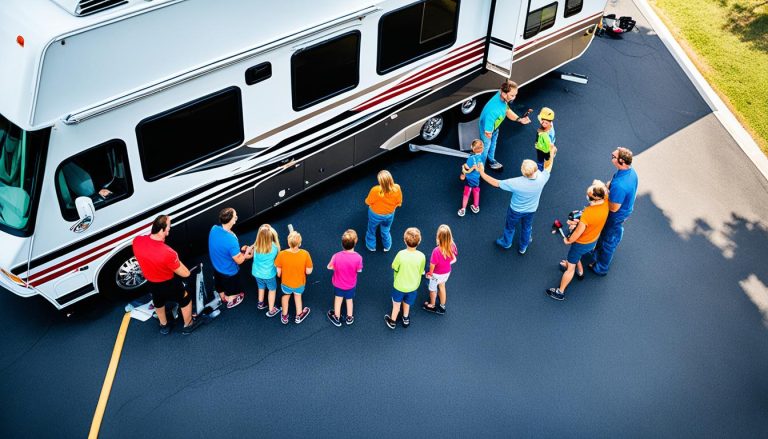Exploring the World of RVs: What Is RV Defined
gorvlifestyle.com and its partners may earn a commission if you purchase a product through one of our links
Are you curious about the world of RVs? What exactly is an RV, and what does it mean? Let’s delve into the realm of recreational vehicles and uncover their definition and significance.
An RV, short for recreational vehicle, is a motor vehicle or trailer that provides living quarters designed for accommodation. It’s a versatile mode of transportation that allows you to travel and stay comfortably on the go. RVs come in various forms, from motorhomes and campervans to trailers and pop-up campers. They range from basic models with essential amenities to luxurious ones equipped with features like air conditioning, televisions, and quartz countertops, offering you a home away from home.
Key Takeaways:
- An RV, or recreational vehicle, is a motor vehicle or trailer designed for accommodation on the go.
- RVs come in different types, including motorhomes, campervans, trailers, and pop-up campers.
- RVs range from basic models to luxurious ones with various amenities.
- An RV allows you to travel and stay comfortably, providing a home away from home.
- RVs offer the freedom to explore different destinations and enjoy the comforts of home while on the road.
The History and Evolution of RVs
RVs, also known as recreational vehicles, have a rich history that dates back over a century. From humble beginnings as horse-drawn caravans and temporary housing structures, RVs have evolved into the modern marvels we know today. Let’s take a closer look at the fascinating journey and development of RVs, from their early models to the advanced vehicles that define the industry.
In the late 19th century, the first purpose-built RVs made their debut. These early models were designed to provide temporary shelter and basic amenities for travelers. As time passed, RVs underwent significant advancements and became more specialized to cater to different needs and preferences.
By the early 20th century, motorhomes and travel trailers gained popularity. Motorhomes, also known as motor coaches or motorcaravans, were equipped with living quarters and built on truck or bus chassis. Travel trailers, on the other hand, were designed to be towed behind vehicles.
Early RV models provided a comfortable and convenient way for people to explore the great outdoors and embark on adventures. They allowed individuals and families to travel and camp while enjoying the comforts of home.
After World War II, the RV industry experienced significant growth and expansion. This was due in part to the increasing affluence and desire for leisure travel among the general population. Manufacturers began introducing more luxurious and feature-packed RVs, catering to the growing demand for a comfortable and convenient travel experience.
Today, RVs have become a popular choice for leisure travel, with a wide range of models and styles available. From compact campervans to spacious motorhomes, there is an RV to suit every lifestyle and budget. RVs have also become more technologically advanced, offering modern amenities such as air conditioning, entertainment systems, and fully equipped kitchens.
The evolution of RVs has transformed the way we travel and explore. These versatile vehicles have opened up a world of possibilities, allowing us to embark on epic road trips, discover hidden gems, and create lasting memories with loved ones.
The following table provides a brief overview of the evolution of RVs, highlighting key milestones and innovations:
| Year | Milestone |
|---|---|
| 1880s | Horse-drawn caravans and temporary housing structures |
| Late 19th century | First purpose-built RVs introduced |
| Early 20th century | Introduction of motorhomes and travel trailers |
| Post-World War II | Significant growth and expansion of the RV industry |
| Present day | Technologically advanced RVs with luxurious amenities |
As the RV industry continues to evolve, we can expect to see even more innovative designs and features that enhance the overall RV experience. Whether you’re a seasoned RV enthusiast or just starting to explore the world of RV travel, these vehicles offer a unique and exciting way to embark on unforgettable adventures.
Types of RVs and Their Features
There are various types of RVs available, each offering a unique set of features and amenities to suit different preferences and needs. Whether you’re looking for a luxurious home on wheels or a compact and versatile option, there’s an RV type to fit your lifestyle.
1. Class A Motorhomes
Class A motorhomes are the epitome of luxury and comfort. Built on truck or bus chassis, these RVs offer spacious living areas, fully-equipped kitchens, and ample storage space. They often come with luxurious amenities like air conditioning, satellite TV, and high-quality furnishings. Class A motorhomes are perfect for long trips or full-time living.
2. Class B Motorhomes
Class B motorhomes, also known as camper vans, combine the convenience of a smaller vehicle with some of the amenities of a larger RV. They are compact and easy to maneuver, making them ideal for solo travelers or couples. Despite their smaller size, Class B motorhomes can still offer sleeping space, a kitchenette, and a bathroom.
3. Class C Motorhomes
Class C motorhomes strike a balance between Class A and Class B. These RVs typically have a sleeping or cargo space above the cab, providing additional room for families or larger groups. Class C motorhomes offer comfortable living quarters, a functional kitchen, and some even have slide-outs to expand the interior space.
4. Pop-Up Campers
Pop-up campers, also known as tent trailers, are lightweight and compact RVs that fold down for easy storage and towing. Once set up, they provide sleeping space, a small kitchen area, and a dinette. These versatile campers are a budget-friendly option and are great for those who love camping with a touch of convenience.
5. Travel Trailers
Travel trailers are towable RVs that come in various sizes and floor plans. They offer a wide range of amenities, from basic models with essential features to high-end options with full kitchens, separate bedrooms, and spacious living areas. Travel trailers are popular among families and those who prefer the flexibility of towing their RV.
6. Fifth Wheels
Fifth wheels are large towable RVs that provide a spacious and residential feel. They are designed to be towed by a pickup truck equipped with a specialized hitch. Fifth wheels often have multiple slide-outs, creating additional living space, and can offer luxurious features like full-sized appliances, entertainment systems, and even fireplaces.
7. Toy Haulers
Toy haulers are RVs specifically designed to carry and accommodate recreational vehicles or “toys” such as motorcycles, ATVs, or bicycles. They feature a separate garage area at the back that can be transformed into additional living space. Toy haulers are popular among adventure enthusiasts who enjoy outdoor sports and activities.
No matter which type of RV you choose, each offers its own unique features and benefits to enhance your travel experience. Consider your needs, budget, and desired amenities to find the perfect RV for your next adventure.
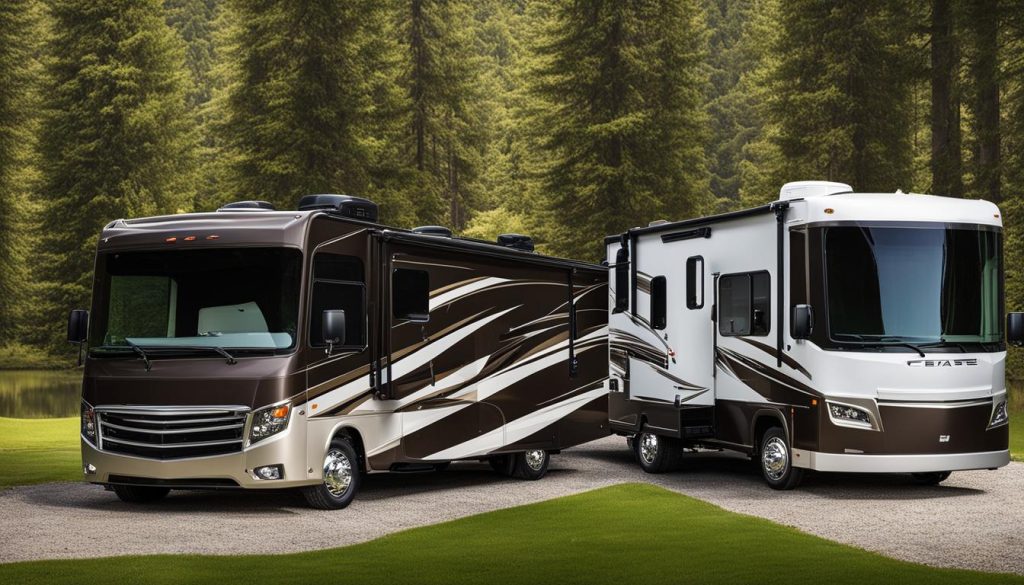
Understanding RV Weight and Capacity
When it comes to safe and efficient travel in an RV, understanding its weight and capacity is essential. By familiarizing yourself with key terms related to RV weight and capacity, you can make informed decisions and avoid potential risks on the road.
Curb weight: This refers to the actual weight of the RV, including all standard equipment and essential fluids. It does not include any additional cargo, passengers, or optional accessories.
Gross vehicle weight rating (GVWR): The GVWR is the maximum allowable weight of the fully loaded RV, including all passengers, cargo, and fuel. Exceeding the GVWR can lead to poor handling, increased wear on the RV, and potential safety hazards.
Payload capacity: This represents the maximum weight that can be placed in or on the RV, including passengers, luggage, and other cargo. It is calculated by subtracting the curb weight from the GVWR.
Gross trailer weight rating (GTWR): For RVs that can tow trailers, the GTWR refers to the maximum weight of the fully loaded trailer. It is crucial to ensure that the RV’s towing capacity matches or exceeds the GTWR to tow safely.
Additionally, there are other factors to consider when evaluating an RV’s weight and capacity. These include:
- Cargo carrying capacity: The maximum weight of additional cargo that can be safely loaded into the RV, including personal belongings, supplies, and equipment.
- Tongue weight: The downward force exerted on the hitch ball by the trailer’s coupler. It is important to maintain proper tongue weight to ensure stable towing and prevent trailer sway.
- Net carrying capacity: The total weight that can be added to the RV after accounting for the curb weight and optional equipment. It represents the available weight for passengers, cargo, and fluids.
By understanding these weight-related terms and considering them when selecting an RV, you can ensure that you choose a vehicle that meets your towing needs and provides a safe travel experience for you and your passengers.
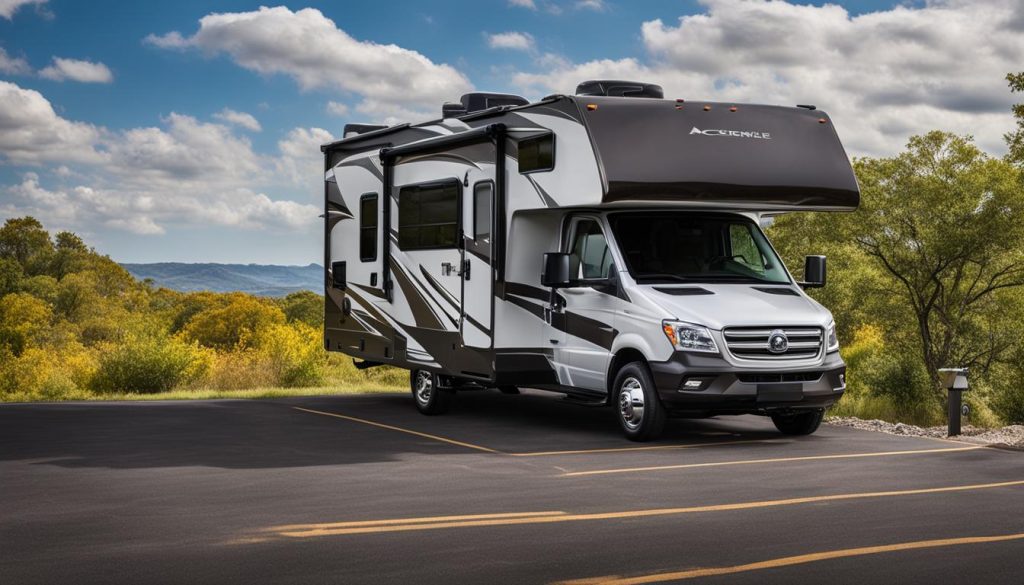
The Benefits of RV Travel and Lifestyle
RV travel offers numerous benefits that make it an appealing choice for adventurers and those seeking a unique travel experience. Whether you’re planning a short weekend getaway or a cross-country journey, embracing the RV lifestyle can provide you with unparalleled freedom and flexibility.
Freedom to Explore
One of the key advantages of RV travel is the freedom to explore different destinations at your own pace. With an RV, there are no constraints of hotel reservations or strict itineraries. You have the flexibility to change your plans and discover hidden gems along the way. Whether you want to embark on a scenic road trip, visit national parks, or enjoy coastal charm, an RV allows you to follow your wanderlust and create unforgettable memories.
All the Comforts of Home
RVs offer the convenience of bringing along all the comforts of home on your travels. Unlike traditional camping, where you have to rely on tents and limited amenities, RVs provide you with a cozy living space equipped with essential facilities. You’ll have a comfortable bed, a fully functional kitchen to cook your favorite meals, a bathroom with a shower, and often, amenities such as air conditioning and entertainment systems. RVs ensure that you can enjoy the adventure without compromising on comfort.
Connect with Nature and Outdoor Activities
RV travel allows you to connect with nature and fully immerse yourself in outdoor activities. From hiking and fishing to biking and kayaking, there are endless opportunities for adventure in the great outdoors. With an RV, you can easily access camping sites in scenic locations, waking up to the sounds of nature and having breathtaking landscapes right at your doorstep. Whether you prefer relaxing by the beach or exploring mountains and forests, RV travel opens doors to unforgettable experiences.
“The RV lifestyle offers a unique way to connect with nature, explore new destinations, and enjoy the freedom of the open road.” – Jennifer Carter, RV enthusiast
Experience Cultural and Environmental Diversity
RV travel allows you to experience the diversity of cultural and environmental attractions in different regions. From visiting historical landmarks and museums to indulging in local cuisine and festivals, RV travel offers a rich cultural experience. Additionally, you can explore different natural wonders such as national parks, lakes, and mountains, observing the unique flora and fauna and appreciating the beauty of our planet. RV travel provides an opportunity to broaden your horizons and gain a deeper understanding of the world we live in.
Sense of Adventure and Community
Living an RV lifestyle can provide a sense of adventure and self-sufficiency. The thrill of exploring unknown territories, venturing off the beaten path, and embracing new challenges can be incredibly rewarding. Furthermore, the RV community is vibrant and welcoming, allowing you to connect with like-minded individuals in RV parks and campgrounds. You can share stories, tips, and experiences, fostering a sense of camaraderie and support among fellow adventurers.
In conclusion, RV travel offers a world of possibilities and benefits. The freedom to explore, the comfort of home on the road, the connection with nature, the exposure to diverse cultures, and the sense of adventure and community all contribute to a fulfilling RV travel and lifestyle experience. So, pack your bags, hit the open road, and embark on the journey of a lifetime in your very own RV.
Choosing the Right RV for Your Needs
When it comes to selecting the perfect RV, making the right choice is essential for a smooth and enjoyable travel experience. To ensure you find the ideal RV that fits your budget, travel needs, and lifestyle preferences, here are some key factors to consider:
- Determine the Type: Start by deciding whether you prefer a motorhome or a towable RV. Motorhomes provide convenience and ease of use, while towable RVs offer flexibility and the ability to detach your vehicle for exploration.
- Consider Size and Layout: Think about the number of people who will be traveling with you and the space you’ll need. Consider the layout, sleeping arrangements, and storage options that are essential for your comfort and convenience.
- Research Brands and Models: Explore different RV brands and models to find the one that best meets your requirements. Read reviews from other RV owners to get insights into the quality, durability, and overall satisfaction of different options.
- Visit RV Dealerships: Take the time to visit local RV dealerships to see the vehicles up close. This will give you a firsthand look at the features and amenities available, allowing you to determine their suitability for your needs and preferences.
- Assess Ownership Costs: Consider factors like maintenance requirements, fuel efficiency, and storage options when assessing the ownership costs of an RV. Being aware of the ongoing expenses can help you budget and choose an RV that aligns with your financial goals.
By carefully considering these factors and conducting thorough research, you’ll be able to choose an RV that suits your lifestyle and ensures memorable adventures on the road.
Making the Most of Your RV Adventures
To make the most of your RV adventures, follow these RV travel tips and plan your trips carefully. Start by creating a travel itinerary, considering the destinations you want to visit and the routes you’ll take. Research campgrounds and RV parks along the way, and check if any permits or reservations are required for specific locations. This will help you ensure a smooth and enjoyable journey.
Before setting out on your trip, it’s essential to prepare all the necessary supplies and equipment. Pack clothing, food, and personal items, making sure you have enough for the duration of your adventure. Don’t forget camping essentials such as a tent, camping chairs, and a grill for outdoor cooking. Stock up on items like water, toiletries, and first aid supplies to cover all your needs.
Prioritize RV maintenance and safety as well. Be sure to service your RV before hitting the road, checking the engine, tires, brakes, and lights. Familiarize yourself with important safety practices, like how to properly hitch a trailer or stabilize your RV. Carry a toolkit and spare parts to handle minor repairs on the go. By taking these precautions, you can mitigate any potential issues and ensure a worry-free journey.
Lastly, embrace the RV camping experience. Get involved in various camping and outdoor activities available in different locations. Explore hiking trails, go fishing, or simply relax by the campfire. Connect with other RV enthusiasts at campgrounds and RV parks, exchanging stories and tips. Take the opportunity to create lasting memories with your loved ones and fully enjoy the freedom and beauty of the RV lifestyle.
FAQ
What is an RV?
An RV, or recreational vehicle, is a motor vehicle or trailer that includes living quarters designed for accommodation.
How long have RVs been around?
RVs have been around for more than a century, with their origins dating back to horse-drawn caravans and temporary housing structures.
What are the different types of RVs?
There are various types of RVs, including motorhomes, campervans, coaches, caravans, fifth-wheel trailers, popup campers, and truck campers.
What features do RVs have?
RVs can range from basic models with essential amenities to luxurious ones with features like air conditioning, televisions, and quartz countertops.
How do I choose the right RV for my needs?
When choosing an RV, consider factors such as your budget, travel needs, and lifestyle preferences. Research different brands and models, read reviews, and visit dealerships to see the options available.
What are the benefits of RV travel and lifestyle?
RV travel offers the freedom to explore different destinations, the ability to bring all the comforts of home, and the flexibility to create your own travel itinerary. RV lifestyle provides a sense of adventure, self-sufficiency, and the opportunity to connect with like-minded individuals in RV communities and campgrounds.
How do I understand RV weight and capacity?
Understanding the weight and capacity of an RV is important for safe and efficient travel. Key terms to be aware of are curb weight, gross vehicle weight rating, payload capacity, and gross trailer weight rating.
How can I make the most of my RV adventures?
To make the most of your RV adventures, plan your trips, prepare necessary supplies and equipment, familiarize yourself with maintenance and safety practices, and embrace the RV lifestyle by exploring different camping and outdoor activities.

